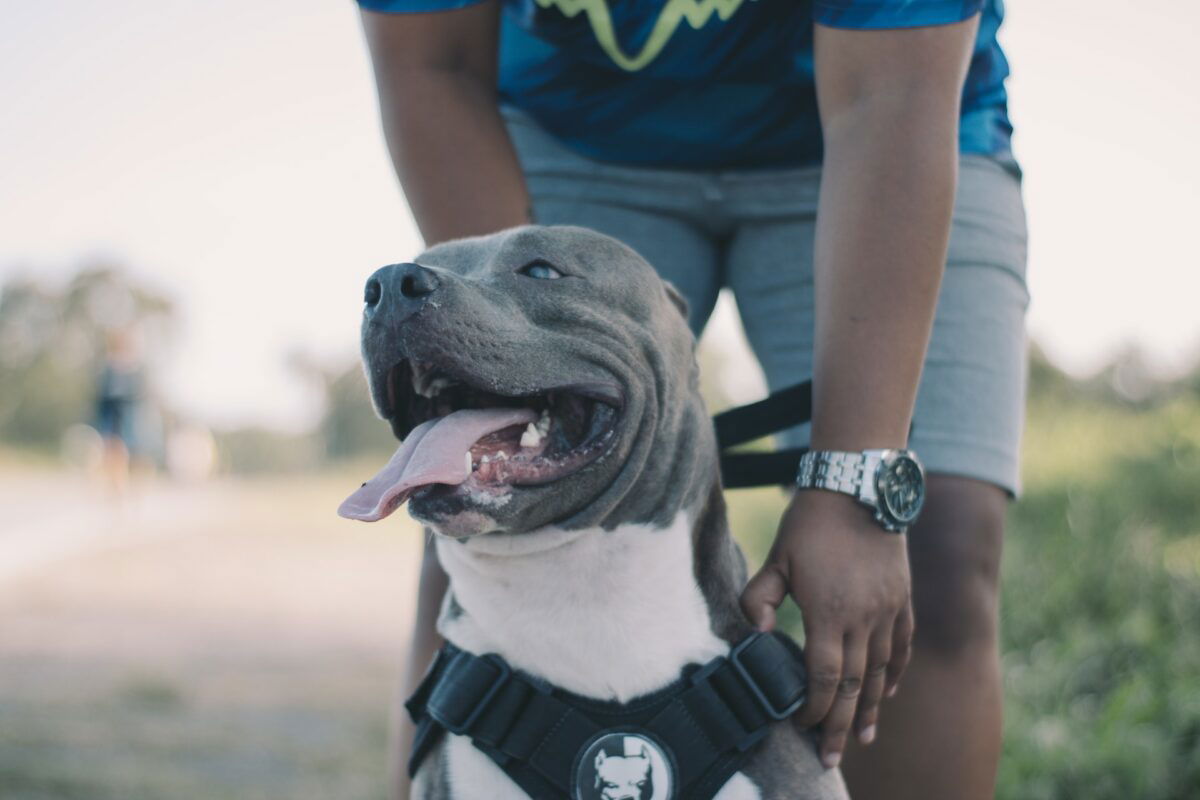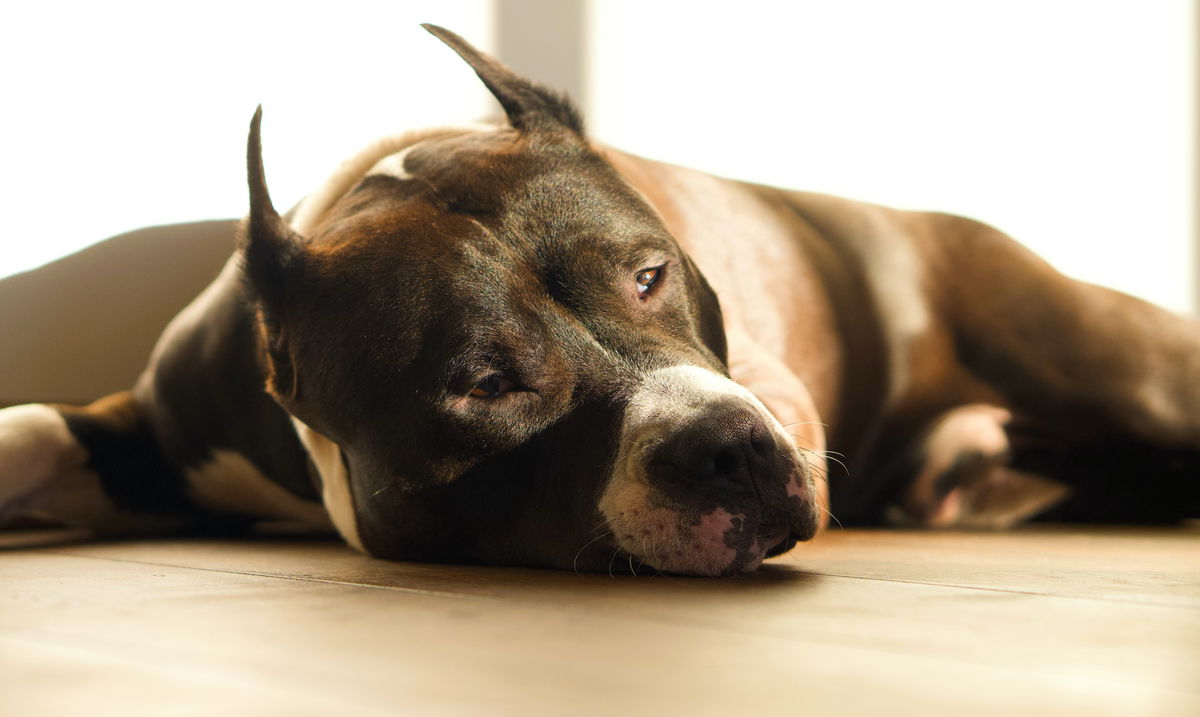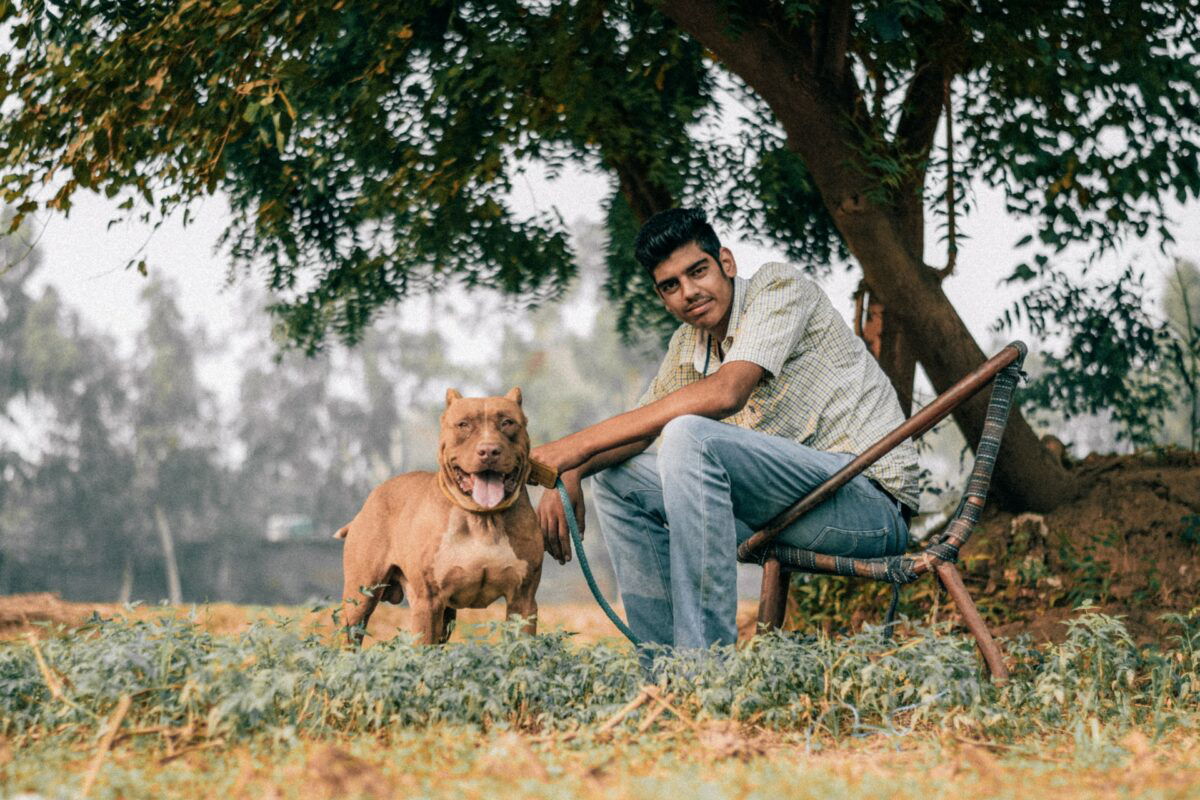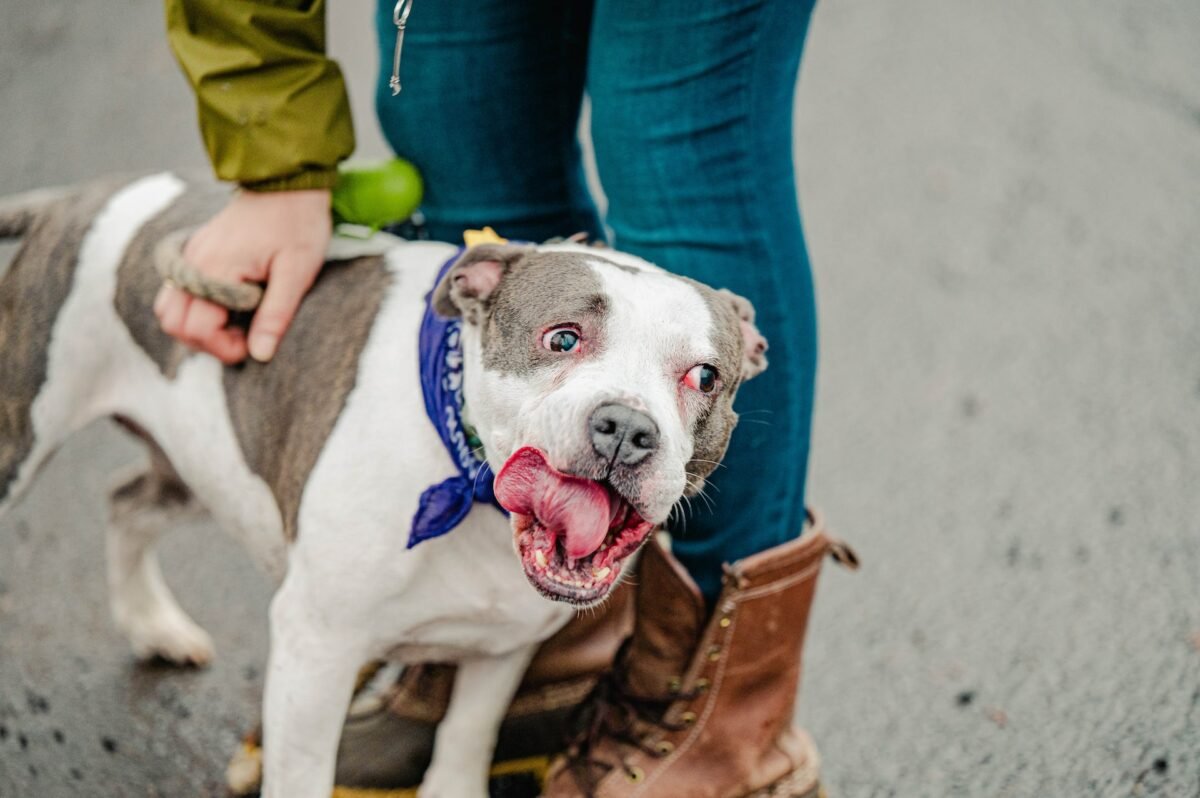We're an affiliate
We hope you love the products we recommend! Just so you know, we may collect a share of sales or other compensation from the links on this page at no additional cost to you. Thank you if you use our links, we really appreciate it!
Despite being unfairly stereotyped as naturally aggressive dogs, Pitbulls have proven to be one of the friendliest and most obedient family pets.
The kind nature of Pitbulls is embedded in their genes to the extent of tending toward total dependence on their owners.
This behavior always leaves dog parents wondering the reasons why pitbulls are clingy. It is common for lovable Pitties to stick by their human family for long hours and even sleep by their side.
Some pet parents may find this clingy behavior a bit concerning especially when they need some private space.
Luckily enough, Pitbulls are among the top 100 most intelligent dog breeds, making them easy to train for behavior modification.
Keep reading this post as we unpack the common reasons and benefits for clinginess in Pitbulls, when it can be a concern, and what you can do to save the situation.
Understanding Clinginess in Dogs
Dogs who have an inherent desire to be so close to their human caregivers can translate the behavior into clinginess.
Such dogs have developed a devoted loyalty and bond with their human family and they follow them from one room to the next.
Clinginess can be defined as a behavioral attribute in dogs who show an intensified desire for close proximity and interaction with their owners.
The average dogs in most homes are known to desire their owner’s attention, but clingy dogs take the desire to a whole new level by literally sticking by their owners (Velcro dogs).
Clingy dogs are prone to separation anxiety when they’re left alone, and this may cause emotional distress and unwanted behavior.
Factors Influencing a Dog’s Clingy Behavior
Clingy behavior may vary from one dog to the other depending on several factors which are highlighted below:
1. Genetics and breed Predisposition
Different dog breeds were originally bred for different purposes, some of which required them to be obedient to their handlers.

Pitbulls were originally bred for the now-outlawed bullfighting, a trait that required them to collaborate with their handlers in bringing down a bull.
The breed’s inherent characteristics and temperament play a major role in determining how the dog will form close interactions with their human caregivers.
2. Early socialization and experience
Dogs who don’t receive early social training may not know how to behave in the presence of other canines or people.
Such dogs may become overly dependent on their owners as they try to figure out what is expected from them at every turn.
A socially untrained dog is likely to feel secure in the presence of their owner only, and these actions may lead to clinginess since they’re afraid of others.
3. Environmental factors
The immediate environment in which your dog is raised has a huge impact on their social behavior and growth.
Dogs who live in a gated housing estate with limited social interactions with other pets and people are more likely to show clinginess to their owners.
The smaller the dog’s social circle, the more attached they will be to their owners.
Reasons Why Pitbulls Are So Clingy
The term Pitbull does not really refer to a single breed, but it is a collection of distinctive dog breeds with very similar traits.
Most people use the term Pitbull to refer to the American Pitbull Terriers, but other similar breeds include; American Bully, American Staffordshire terriers, or the Staffordshire Bull Terrier.
All these distinctive Pitbull breeds have a strong inclination to form strong bonds with their human families including children.
The following are some of the factors that contribute to clinginess in Pitbulls:
1. Loyalty and pack mentality
Pitbulls are naturally wired to form a close bond with their human family, and sometimes, they can elevate the bond to become clingy.
Pitbulls were originally bred for their loyalty and protective nature, which currently contributes to their intensified attachment to their owners.
In addition to unwavering loyalty, Pitbulls are genetically equipped to collaborate with humans in their daily tasks, making them see humans as part of their pack.
Their close cooperation with their caregivers made them regard humans as their pack leaders, making them very loyal and clingy to the core.
Pitbulls’ loyalty is written in their genetic makeup, and this makes them naturally gravitate toward staying close to their human ‘pack leaders’.
2. Emotional sensitivities and responsiveness
Despite their muscular bodies, Pitbulls have a strong emotional attachment to those they love. This passionate connection makes Pitbulls highly responsive to their owner’s feelings.
If you’re feeling down, your Pitbull is most likely going to read your feelings and sit close by to offer comfort.
Pitbulls are intelligent dogs and they can respond quickly to their handler’s emotions by observing body language, tonal variation, and other cues.
These gentle giants can become clingy to their owners, thanks to their ability to read human emotions and respond promptly.
3. Protective instincts and territorial behavior
Pitbulls have heightened levels of protective instincts and sometimes territoriality, both of which manifest in clinginess to their owners.
The bold nature of Pits stems from some of their ancestors, the Old English Terrier and the Bulldog.
It is these protective instincts that compel Pitbulls to stay close to their owners and safeguard them from potential threats or attacks.
4. Training and positive reinforcement
It is indeed possible that your Pitbull is following you from one room to the other because they lack the relevant social training.
Pitbulls are eager to please, and they may develop certain behaviors because they think it makes their owners happy.
So, if your Pitbull cannot sleep away from you, or they demand constant attention and you give them, you may have reinforced their clingy behavior unknowingly.
4 Factors Influencing Clinginess in Pitbulls
A Velcro Pitbull is a result of a combination of several factors that push them to form very close associations with their human caregivers.
As a responsible Pitbull owner, you need to understand these factors to be able to address the heightened attachment when it becomes a problem.
Some of the factors responsible for Pitbull clinginess include:
1. Genetic predisposition and temperament traits
As we mentioned earlier, Pitbulls are naturally inclined to stay close to their owners, thanks to their genetic makeup.
The original breeders of Pitbulls were looking for a strong dog, that could be pitted against a bull, but they also desired to make them loyal to their human collaborators.
These traits have since been carried along the generations into the present day Pitbulls, who still have the desirable temperament to stay close to their human family.
2. Impact of early life experiences and socialization
Despite the genetic predisposition of Pitbulls to clinginess, pet parents are required to play a vital role in shaping their dog’s social behavior.
Exposing your Pitbull puppy to various social settings, pets, and people can play a huge role in reducing their tendencies to separation anxiety.
Creating positive interactions with your Pitbull from a tender age can help them in shaping moderate attachment behavior and reduce the chances of clinginess.
3. The role of training methods in shaping behavior
We suggest using positive reinforcement techniques when training your Pitbull to form desirable social behavior.
You can do this by rewarding desirable behavior and redirecting the excessive clinginess to correct the heightened attachment.
If you have a clingy Pitbull who wants to sleep by your side, you can slowly redirect them to a comfortable dog bed and praise them when they sleep alone.
Modifying a dog’s behavior can be a long process depending on how rooted the issue is. We recommend staying consistent and being patient with your dog as you teach them new tricks.
4. Health and emotional well-being affecting clinginess
Sometimes your Pitbull may demand constant attention from you because they are in pain or experiencing discomfort due to a health problem.
The physical contact and attention from you may alleviate the pain or insecurity of your ill Pitbull.

Pitbulls suffering from separation anxiety may need reassurance from their human caregivers by struggling to stay close throughout the day.
Some of the other symptoms that should tell you about your dog’s health status include excessive barking, symptoms of pain, unwillingness to walk, and reduced excitement.
Signs of Clingy Behavior in Pitbulls
As a Pitbull owner, you need to know the signs of a Velcro dog to understand the needs and offer prompt solutions in case of a problem.
The following are some of the signs of an excessively clingy Pitbull:
1. Physical signs
- Following you everywhere
- Always sleeping by your side
- Seeking constant attention from you
- Cannot be alone even for a short time
- Always anticipating your next move
2. Behavioral signs
- Separation anxiety
- Becoming distressed when left alone
- Inability to settle alone
- Emotional instability
Distinguishing Between Healthy Attachment and Excessive Clinginess
As a responsible Pitbull owner, you need to know the difference between healthy attachment and excessive clinginess in your dog.
Sometimes the line separating the two can be very thin, but with careful observation, you can know when your lovely Pitbull tends to excessive dependence.
A Pitbull with a healthy attachment may occasionally seek your company and enjoy spending time with you, but they can also be content on their own.
Excessive clinginess, on the other hand, is when your Pitbull seeks your attention persistently and becomes overly dependent on you.
A Velcro Pitbull is more likely to display signs of emotional distress or separation anxiety when left alone.
3 Benefits of Clinginess in Pitbulls
Clingy Pitbulls can be tough to deal with when you don’t make time for them.
But when flipping the coin, Pitbull owners can benefit from these dogs’ natural tendencies to form strong bonds with them.
The following are some of the benefits you can get by owning a Pitbull with heightened levels of affection:
1. Emotional support and companionship for owners
Velcro Pitbulls can stick by their chief caregivers no matter the circumstance. You can benefit from this unwavering companionship by seeking emotional support from your beloved pup.
Sharing close spaces for a long time with a clingy Pitbull may lead to a reduction in stress in both the dog and the caregiver.
This also creates a chance for strengthening the bond and forming deeper companionship which can elevate your mood when feeling lonely.
2. Pitbulls as therapy and emotional support animals
A clingy Pitbull who thrives on human interactions can be trained to provide emotional support to elderly people and nursing homes.
A therapy Pitbull can literally stick by the side of a recovering patient and this can be therapeutic to the patient.
3. Positive impact on mental health and well-being
If you own a clingy Pitbull, you can attest to how they can encourage you to go out for daily exercises.
Providing your dog with daily exercises and increased playtime is good for their overall physical health and emotional well-being.
People who live in a secluded neighborhood may benefit from the companionship offered by clingy Pitbulls by lessening solitude.
Addressing Clinginess: 4 Tips for Pitbull Owners
While it may be beneficial to form a solid emotional bond with your beloved Pitbull, sometimes this clinginess can lead to separation anxiety on the part of the dog.
If you notice any signs of excessive clinginess or total dependence from your dog, we suggest that you take a proactive approach to redirect this behavior before it turns against your dog.
The following practical tips have been tried and tested to manage clingy behavior in Pitbulls and to promote healthy attachments:
1. Importance of setting boundaries and providing structure
Before training your Pitbull to become less dependent on you, it’s crucial that you set clear boundaries in your house for the human family and pets.
Create and furnish your dog’s personal space by including a comfortable bed, crate, playpen, toys, food bowl, and other dog accessories to keep your pup engaged.
Furnishing your Pitbull’s space will make it appealing and appropriate for them to self-soothe without depending on the owner’s input.
Establish a clear boundary between your space and the dog’s personal space by teaching them to respect your area.
2. Positive reinforcement training techniques
Make sure to reward your Pitbull with treats and praises in times when they enjoy some solitude moments.
This will help your Pitbull reinforce the idea of occasionally staying alone because it comes with some goodies.
As you train your dog to be independent, make sure they’re familiar with basic commands such as wait, come, sit and stay.
3. Gradual exposure to separation to reduce dependency
Encourage your beloved Pitbull to become more independent by gradually increasing the time they spend alone.

Remember to start with short periods and extend the duration little by little. You can desensitize your clingy pup by trying to leave them alone as a way of lowering their anxiety levels.
4. Mental and physical stimulation to prevent over-attachment
We recommend offering some interactive toys when leaving your pup alone for short periods of training.
Puzzles and treat dispensing toys can be a great way of keeping your Pitbull’s mind engaged and relieving emotional distress while rewarding them for solving puzzles.
This will keep your Pitbull occupied and slowly reduce their dependence on human attention to thrive.
Frequently Asked Questions (FAQs)
1. Why are Pitbulls so attached to their owners?
Pitbulls are natively wired to form strong bonds with their owners due to their history as working dogs where they relied on human interactions to thrive.
Pitbulls also have a lovable temperament and loyalty to their caregivers which makes them easy to form bonds that tend toward clinginess.
2. Why do Pitbulls like to cuddle so much?
Pitbulls’ desire to cuddle with their owners can be attributed to their affectionate nature which makes them constantly seek the physical presence of those they love.
Cuddling provides Pitbulls with an assurance of their owner’s love and comfort.
3. Are Pitbulls overly affectionate?
Although Pitbulls are well-known for their friendly nature, whether they’re overly affectionate or not will depend on the individual dog and not the collective breed.
While it’s likely for Pitbulls to show heightened emotional connections with their caregivers, some well-trained Pitbulls can show a balance between healthy attachment and clinginess.
4. Do Pitbulls bond to one person?
For the most part, clingy Pitbulls may become overly attached to one person – that is their main caregiver.
The responsible person providing the Pitbull with all the love, exercise, bond, and training is likely to become the center of attraction for the clingy dog.
However, it’s essential to appreciate that all dogs are different to some level, and some Pitbulls may bond equally with all family members.
5. Can training reduce the clinginess of a pitbull?
Absolutely! Positive reinforcement training is one of the best methods to reduce clingy behavior in Pitbulls.
Start by setting boundaries for your dog, teach them to respect your personal space, and proceed by desensitizing them to the environment.
Remember to provide physical and mental stimulation to keep the dog active and relieved from anxiety.
With a consistent training approach and patience on your side, you can modify your dog’s habits to make them more independent and secure.
Conclusion
Pitbulls are affectionate dogs who need lots of love, bonding time, and appreciation from their human handlers.
These muscular dogs are predisposed to form clingy behavior, thanks to their genetic makeup, temperament, and desire to please their owners.
If you’re looking for a dog to stay by your side and offer you emotional support, then you may want to consider adopting a Pitbull.
On the other hand, if you’re tired of your Pitbull’s clingy behavior, we hope that this article helped in figure out the causes and what you can do.
Laura is the founder of Furs'n'Paws. She is a also a pet writer and expert with more than 20 years of experience of working with dogs and cats. She developed a very strong love for animals at a young age. Her passion led her to establish a thriving pet sitting and dog walking business in Dubai. As an expert in pet training, behavior, and nutrition, Laura is committed to helping pet owners and pet lovers by offering high-quality information on a wide range of topics.



No responses yet